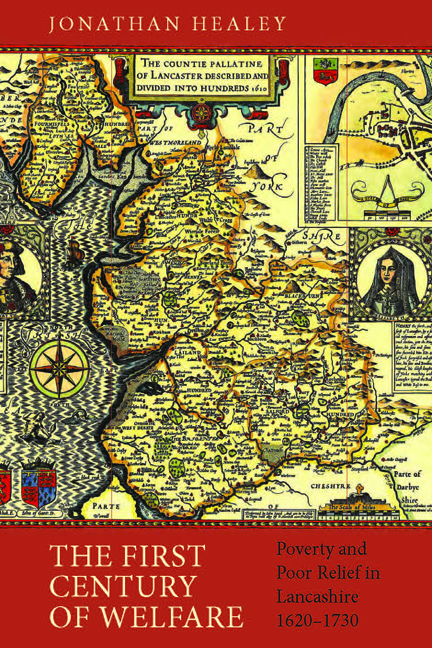Book contents
- Frontmatter
- Dedication
- Contents
- List of Figures
- List of Tables
- Preface
- List of Abbreviations
- Prologue: Becoming Poor
- Introduction: The First Century of Welfare
- PART I CONTEXTS
- PART II MARGINALITY
- 4 Marginal People: Descending into Poverty?
- 5 Resourceful People: Survival Strategies of the Lancashire Poor
- PART III MISFORTUNE
- Conclusion: Worldly Crosses
- Bibliography
- Index
4 - Marginal People: Descending into Poverty?
from PART II - MARGINALITY
Published online by Cambridge University Press: 05 November 2014
- Frontmatter
- Dedication
- Contents
- List of Figures
- List of Tables
- Preface
- List of Abbreviations
- Prologue: Becoming Poor
- Introduction: The First Century of Welfare
- PART I CONTEXTS
- PART II MARGINALITY
- 4 Marginal People: Descending into Poverty?
- 5 Resourceful People: Survival Strategies of the Lancashire Poor
- PART III MISFORTUNE
- Conclusion: Worldly Crosses
- Bibliography
- Index
Summary
Men tumble up and downe in the world.
The Diary of Ralph Josselin (1653)The first question we must ask ourselves is, who were the poor? In subsequent chapters, it will be suggested that the deserving poor were those suffering certain contingencies, certain ‘crosses and losses’. But before we look at this, we must ask whether the poor were part of a distinctive group within English society, living lives of marginality across their life cycle, or whether they were ordinary people fallen on especially hard times. The answer, as it turns out, is that they could be either.
The position of the poor within English society has been an important historiographical subtheme. Keith Wrightson, for example, has suggested that England's Old Poor Law embodied a balance between ‘communal identification’ on the one hand, and ‘social differentiation’ on the other. Parochial poor relief strategies represented both the acceptance of paupers into a community as legitimate objects of charity, but also their obvious social difference from those who were wealthy enough to give relief. It is a view that implies the existence of two distinct groups within rural society: the ‘poor’ and the comparatively wealthy, who were then subject to these paradoxical relationships towards each other. Indeed, Wrightson's work has argued forcefully that rural England circa 1580–1680 saw its ‘middling sort’, amongst whom most parochial officers were found, become increasingly – culturally and economically – differentiated from their poorer neighbours.
- Type
- Chapter
- Information
- The First Century of WelfarePoverty and Poor Relief in Lancashire, 1620–1730, pp. 113 - 126Publisher: Boydell & BrewerPrint publication year: 2014

